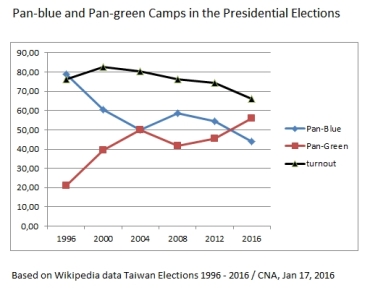Before the old (lunar) year leaves and a new comes in, things need to be tidied up in China. However, efforts to calm the stock markets by new management measures appear to have been unsuccessful. And in Hong Kong, where RMB trading, is unrestricted, people pay less for China’s currency, according to the New York Times.
There’s still other bad news, and the indicator in this case, too, is Hong Kong.
“Something terrible has happened. We are all afraid. We are leaving now,” an employee told me a few hours before locking the doors for the foreseeable future.
That’s how the BBC‘s correspondent in the former British colony, Juliana Liu, concluded an entry in the broadcaster’s China blog on Monday, and the topic, of course, is the case of five Hong Kong citizens, all associated with the Causeway Bay Bookstore, who have gone missing since October last year. The latest case is Paul Lee, and he went missing late in December.
Hong Kong’s SCMP, one of East Asia’s leading English-language papers, but one with an uncertain future, reported on Monday the first precept speech by a Chinese leader since Mao Zedong. The guy who’s imitating the late great dictator is, of course, current party secretary general, state chairman, and the central military commissions’ (CMC) chairman Xi Jinping. The speech is seen as part of Xi’s efforts to reform China’s military, but obviously, the – probably intended – signal goes beyond the armed forces project.
Given that no other former CMC chairman, from Deng Xiaoping to Hu Jintao, had given a military precept, an associate professor at Shanghai University of Political Science and Law concludes that Xi’s power and authority is even higher than them.
This may or may not be true. If Wang Qishan, rather than Li Keqiang, ranks second in terms of power or influence within the party, the assessement may be correct. But then, maybe Deng Xiaoping, who faced open ideological competition at times by more conservative party veterans like Chen Yun, simply didn’t need to show off his autority by admonishing the military.
Back then, too, the party was corrupted. But that was at a time when – or that’s how it felt, anyway – everyone had a chance to become rich. Now, there’s a two-fold challenge of corruption and slowing growth.
This could mean that Xi has powers because potential rivals do not want to challenge him, so as not to rock the not-so-stable boat.
If China’s regime manages the switch from an export-led economy to a more services-oriented economy successfully, the doubts in Beijing’s macro-economic control of the economy won’t persist – some disappeared people, in China or elsewhere, have never been a great concern to business.
All the Xidadamania aside however, confidence in mainland China, in Hong Kong, and abroad, appears to be slipping, at least currently.
In an interview with German national radio on Thursday, Markus Taube, a professor at a university in Germany’s Ruhr region, stated “a massive loss of confidence” in China:
What we see in China at the moment, definitely, is a massive loss of confidence. All market actors can see that the CCP has clearly lost its former control capacity. Until now, the Chinese market was always a very [unreadable] […]. Now, this ability to lead isn’t in place and that the state has failed several times, on its own promises.
Das, was wir in China momentan definitiv sehen ist ein massiver Vertrauensverlust. Alle Marktakteure sehen, dass die Kommunistische Partei offensichtlich ihre frühere Steuerungskapazität verloren hat. Bislang war der chinesische Markt immer ein sehr [unreadable] … Fundamentaldaten haben da kaum eine Rolle gespielt, und es war das Vertrauen einfach da, dass die Partei, der Staat, im Endeffekt die Richtung vorgibt [unreadable]. Jetzt ist es so, dass diese Führungsfunktion fehlt und dass der Staat mehrfach versagt hat, auf seine eigenen Versprechen hin.
Not least, Taube said, the “anti-corruption campaign” has discouraged Chinese decisionmakers in charge of approving (or delaying) investment projects.
Given that Chinese control mechanisms – concerning the financial markets – are out of order, Taube, with an audible sigh, introduces an old friend from the 2009 tool cabinet:
It sounds unorthodox, but probably, in the current situation, it would be more appropriate to issue another stimulus package, in that the state, again, to a great extent, pumps money into the economy. A classical Keynesian stimulus package to create state-induced demand so as to restore the economic dynamics on a basic level.
Es klingt sehr unorthodox, aber wahrscheinlich ist es in der momentanen Situation tatsächlich eher angesagt, ein klassisches Konjunkturpaket wieder aufzusetzen, einen Stimulus, in dem der Staat einfach in großem Maße wieder Geld in die Volkswirtschaft hineinpumpt. Also ein klassisches keynesianisches Konjunkturprogramm, in dem einfach staatlich induziert Nachfrage geschaffen wird, und damit einfach die volkswirtschaftliche Dynamik auf einem grundlegenden Level wieder stabilisiert wird.
That said, Taube doesn’t judge the situation by standards of five-year plans, or by taking the long view, as recommended by the Lord of the Confucius Institutes. Taube advocates a stimulus because the methods tried more recently haven’t worked and wouldn’t turn the tide for the coming six months.
____________
Updates/Related
» Executives Disappearing, HP, Jan 8, 2016
____________



[…] temporary, too, just as they are at Argentine Radio and TV, and disputes over journalistic content don’t appear to…